- Home
- Jodi Picoult
My Sister's Keeper: A Novel Page 3
My Sister's Keeper: A Novel Read online
Page 3
This girl’s medical vocabulary would put some of my paid experts to shame. I pull a legal pad out of a drawer. “Obviously, you’ve agreed to be a donor for your sister before.”
She hesitates, then shakes her head. “Nobody ever asked.”
“Did you tell your parents you don’t want to donate a kidney?”
“They don’t listen to me.”
“They might, if you mentioned this.”
She looks down, so that her hair covers her face. “They don’t really pay attention to me, except when they need my blood or something. I wouldn’t even be alive, if it wasn’t for Kate being sick.”
An heir and a spare: this was a custom that went back to my ancestors in England. It sounded callous—having a subsequent child just in case the first one happens to die—yet it had been eminently practical once. Being an afterthought might not sit well with this kid, but the truth is that children are conceived for less than admirable reasons every single day: to glue a bad marriage together; to keep the family name alive; to mold in a parent’s own image. “They had me so that I could save Kate,” the girl explains. “They went to special doctors and everything, and picked the embryo that would be a perfect genetic match.”
There had been ethics courses in law school, but they were generally regarded as either a gut or an oxymoron, and I usually skipped them. Still, anyone who tuned in periodically to CNN would know about the controversies of stem cell research. Spare-parts babies, designer infants, the science of tomorrow to save the children of today.
I tap my pen on the desk, and Judge—my dog—sidles closer. “What happens if you don’t give your sister a kidney?”
“She’ll die.”
“And you’re okay with that?”
Anna’s mouth sets in a thin line. “I’m here, aren’t I?”
“Yes, you are. I’m just trying to figure out what made you want to put your foot down, after all this time.”
She looks over at the bookshelf. “Because,” she says simply, “it never stops.”
Suddenly, something seems to jog her memory. She reaches into her pocket and puts a wad of crumpled bills and change onto my desk. “You don’t have to worry about getting paid, either. That’s $136.87. I know it’s not enough, but I’ll figure out a way to get more.”
“I charge two hundred an hour.”
“Dollars?”
“Wampum doesn’t fit in the ATM deposit slot,” I say.
“Maybe I could walk your dog, or something.”
“Service dogs get walked by their owners.” I shrug. “We’ll work something out.”
“You can’t be my lawyer for free,” she insists.
“Fine, then. You can polish my doorknobs.” It’s not that I’m a particularly charitable man, but rather that legally, this case is a lock: she doesn’t want to give a kidney; no court in its right mind would force her to give up a kidney; I don’t have to do any legal research; the parents will cave in before we go to trial, and that will be that. Plus, the case will generate a ton of publicity for me, and will jack up my pro bono for the whole damn decade. “I’m going to file a petition for you in family court: legal emancipation for medical purposes,” I say.
“Then what?”
“There will be a hearing, and the judge will appoint a guardian ad litem, which is—”
“—a person trained to work with kids in the family court, who determines what’s in the child’s best interests,” Anna recites. “Or in other words, just another grown-up deciding what happens to me.”
“Well, that’s the way the law works, and you can’t get around it. But a GAL is theoretically only looking out for you, not your sister or your parents.”
She watches me take out a legal pad and scrawl a few notes. “Does it bother you that your name is backward?”
“What?” I stop writing, and stare at her.
“Campbell Alexander. Your last name is a first name, and your first name is a last name.” She pauses. “Or a soup.”
“And how does that have any bearing on your case?”
“It doesn’t,” Anna admits, “except that it was a pretty bad decision your parents made for you.”
I reach across my desk to hand her a card. “If you have any questions, call me.”
She takes it, and runs her fingers over the raised lettering of my name. My backward name. For the love of God. Then she leans across the desk, grabs my pad, and tears the bottom off the page. Borrowing my pen, she writes something down and hands it back to me. I glance down at the note in my hand:
Anna 555 3211
“If you have any questions,” she says.
• • •
When I walk out to the reception area, Anna is gone and Kerri sits at her desk, a catalog spread-eagled across it. “Did you know they used to use those L. L. Bean canvas bags to carry ice?”
“Yeah.” And vodka and Bloody Mary mix. Toted from the cottage to the beach every Saturday morning. Which reminds me, my mother called.
Kerri has an aunt who makes her living as a psychic, and every now and then this genetic predisposition rears its head. Or maybe she’s just been working for me long enough to know most of my secrets. At any rate, she knows what I am thinking. “She says your father’s taken up with a seventeen-year-old and that discretion isn’t in his vocabulary and that she’s checking herself into The Pines unless you call her by . . .” Kerri glances at her watch. “Oops.”
“How many times has she threatened to commit herself this week?”
“Only three,” Kerri says.
“We’re still way below average.” I lean over the desk and close the catalog. “Time to earn a living, Ms. Donatelli.”
“What’s going on?”
“That girl, Anna Fitzgerald—”
“Planned Parenthood?”
“Not quite,” I say. “We’re representing her. I need to dictate a petition for medical emancipation, so that you can file it with the family court by tomorrow.”
“Get out! You’re representing her?”
I put a hand over my heart. “I’m wounded that you think so little of me.”
“Actually, I was thinking about your wallet. Do her parents know?”
“They will by tomorrow.”
“Are you a complete idiot?”
“Excuse me?”
Kerri shakes her head. “Where’s she going to live?”
The comment stops me. In fact, I hadn’t really considered it. But a girl who brings a lawsuit against her parents will not be particularly comfortable residing under the same roof, once the papers are served.
Suddenly Judge is at my side, pushing against my thigh with his nose. I shake my head, annoyed. Timing is everything. “Give me fifteen minutes,” I tell Kerri. “I’ll call you when I’m ready.”
“Campbell,” Kerri presses, relentless, “you can’t expect a kid to fend for herself.”
I head back into my office. Judge follows, pausing just inside the threshold. “It’s not my problem,” I say; and then I close the door, lock it securely, and wait.
SARA
1990
THE BRUISE IS THE SIZE AND SHAPE of a four-leaf clover, and sits square between Kate’s shoulder blades. Jesse is the one to find it, while they are both in the bathtub. “Mommy,” he asks, “does that mean she’s lucky?”
I try to rub it off first, assuming it’s dirt, without success. Kate, two, the subject of scrutiny, stares up at me with her china blue eyes. “Does it hurt?” I ask her, and she shakes her head.
Somewhere in the hallway behind me, Brian is telling me about his day. He smells faintly of smoke. “So the guy bought a case of expensive cigars,” he says, “and had them insured against fire for $15,000. Next thing you know, the insurance company gets a claim, saying all the cigars were lost in a series of small fires.”
“He smoked them?” I say, washing the soap out of Jesse’s hair.
Brian leans against the threshold of the door. “Yeah. But the judge ruled that the compa
ny guaranteed the cigars as insurable against fire, without defining acceptable fire.”
“Hey, Kate, does it hurt now?” Jesse says, and he presses his thumb, hard, against the bruise on his sister’s spine.
Kate howls, lurches, and spills bathwater all over me. I lift her out of the water, slick as a fish, and pass her over to Brian. Pale towheads bent together, they are a matched set. Jesse looks more like me—skinny, dark, cerebral. Brian says this is how we know our family is complete: we each have our clone. “You get yourself out of the tub this minute,” I tell Jesse.
He stands up, a sluice of four-year-old boy, and manages to trip as he navigates the wide lip of the tub. He smacks his knee hard, and bursts into tears.
I gather Jesse into a towel, soothing him as I try to continue my conversation with my husband. This is the language of a marriage: Morse code, punctuated by baths and dinners and stories before bed. “So who subpoenaed you?” I ask Brian. “The defendant?”
“The prosecution. The insurance company paid out the money, and then had him arrested for twenty-four counts of arson. I got to be their expert.”
Brian, a career firefighter, can walk into a blackened structure and find the spot where the flames began: a charred cigarette butt, an exposed wire. Every holocaust starts with an ember. You just have to know what to look for.
“The judge threw out the case, right?”
“The judge sentenced him to twenty-four consecutive one-year terms,” Brian says. He puts Kate down on the floor and begins to pull her pajamas over her head.
In my previous life, I was a civil attorney. At one point I truly believed that was what I wanted to be—but that was before I’d been handed a fistful of crushed violets from a toddler. Before I understood that the smile of a child is a tattoo: indelible art.
It drives my sister Suzanne crazy. She’s a finance whiz who decimated the glass ceiling at the Bank of Boston, and according to her, I am a waste of cerebral evolution. But I think half the battle is figuring out what works for you, and I am much better at being a mother than I ever would have been as a lawyer. I sometimes wonder if it is just me, or if there are other women who figure out where they are supposed to be by going nowhere.
I look up from drying Jesse off, and find Brian staring at me. “Do you miss it, Sara?” he asks quietly.
I wrap our son in the towel and kiss him on the crown of his head. “Like I’d miss a root canal,” I say.
• • •
By the time I wake up the next morning, Brian has already left for work. He’s on two days, then two nights, and then off for four, before the cycle repeats again. Glancing at the clock, I realize I’ve slept past nine. More amazingly, my children have not woken me up. In my bathrobe, I run downstairs, where I find Jesse playing on the floor with blocks. “I eated breakfast,” he informs me. “I made some for you, too.”
Sure enough, there is cereal spilled all over the kitchen table, and a frighteningly precarious chair poised beneath the cabinet that holds the corn flakes. A trail of milk leads from the refrigerator to the bowl. “Where’s Kate?”
“Sleeping,” Jesse says. “I tried poking her and everything.”
My children are a natural alarm clock; the thought of Kate sleeping so late makes me remember that she’s been sniffling lately, and then wonder if that’s why she was so tired last night. I walk upstairs, calling her name loud. In her bedroom, she rolls toward me, swimming up from the dark to focus on my face.
“Rise and shine.” I pull up her shades, let the sun spill over her blankets. I sit her up and rub her back. “Let’s get you dressed,” I say, and I peel her pajama top over her head.
Trailing her spine, like a line of small blue jewels, are a string of bruises.
• • •
“Anemia, right?” I ask the pediatrician. “Kids her age don’t get mono, do they?”
Dr. Wayne pulls his stethoscope away from Kate’s narrow chest and tugs down her pink shirt. “It could be a virus. I’d like to draw some blood and run a few tests.”
Jesse, who has been patiently playing with a GI Joe that has no head, perks up at this news. “You know how they draw blood, Kate?”
“Crayons?”
“With needles. Great big long ones that they stick in like a shot—”
“Jesse,” I warn.
“Shot?” Kate shrieks. “Ouch?”
My daughter, who trusts me to tell her when it’s safe to cross the street, to cut her meat into tiny pieces, and to protect her from all sorts of horrible things like large dogs and darkness and loud firecrackers, stares at me with great expectation. “Only a small one,” I promise.
When the pediatric nurse comes in with her tray, her syringe, her vials, and her rubber tourniquet, Kate starts to scream. I take a deep breath. “Kate, look at me.” Her cries bubble down to small hiccups. “It’s just going to be a tiny pinch.”
“Liar,” Jesse whispers under his breath.
Kate relaxes, just the slightest bit. The nurse lays her down on the examination table and asks me to hold down her shoulders. I watch the needle break the white skin of her arm; I hear the sudden scream—but there isn’t any blood flowing. “Sorry, sugar,” the nurse says. “I’m going to have to try again.” She removes the needle, and sticks Kate again, who howls even louder.
Kate struggles in earnest through the first and second vials. By the third, she has gone completely limp. I don’t know which is worse.
• • •
We wait for the results of the blood test. Jesse lies on his belly on the waiting room rug, picking up God knows what sorts of germs from all the sick children who pass through this office. What I want is for the pediatrician to come out, tell me to get Kate home and make her drink lots of orange juice, and wave a prescription for Ceclor in front of us like a magic wand.
It is an hour before Dr. Wayne summons us to his office again. “Kate’s tests were a little problematic,” he says. “Specifically, her white cell count. It’s much lower than normal.”
“What does that mean?” In that moment, I curse myself for going to law school, and not med school. I try to remember what white cells even do.
“She may have some sort of autoimmune deficiency. Or it might just be a lab error.” He touches Kate’s hair. “I think, just to be safe, I’m going to send you up to a hematologist at the hospital, to repeat the test.”
I am thinking: You must be kidding. But instead, I watch my hand move of its own accord to take the piece of paper Dr. Wayne offers. Not a prescription, as I’d hoped, but a name. Ileana Farquad, Providence Hospital, Hematology/Oncology.
“Oncology.” I shake my head. “But that’s cancer.” I wait for Dr. Wayne to assure me it’s only part of the physician’s title, to explain that the blood lab and the cancer ward simply share a physical location, and nothing more.
He doesn’t.
• • •
The dispatcher at the fire station tells me that Brian is on a medical call. He left with the rescue truck twenty minutes ago. I hesitate, and look down at Kate, who’s slumped in one of the plastic seats in the hospital waiting room. A medical call.
I think there are crossroads in our lives when we make grand, sweeping decisions without even realizing it. Like scanning the newspaper headline at a red light, and therefore missing the rogue van that jumps the line of traffic and causes an accident. Entering a coffee shop on a whim and meeting the man you will marry one day, while he’s digging for change at the counter. Or this one: instructing your husband to meet you, when for hours you have been convincing yourself this is nothing important at all.
“Radio him,” I say. “Tell him we’re at the hospital.”
• • •
There is a comfort to having Brian beside me, as if we are now a pair of sentries, a double line of defense. We have been at Providence Hospital for three hours, and with every passing minute it gets more difficult to deceive myself into believing that Dr. Wayne made a mistake. Jesse is asleep in a plastic cha
ir. Kate has undergone another traumatic blood draw, and a chest X ray, because I mentioned that she has a cold.
“Five months,” Brian says carefully to the resident sitting in front of him with a clipboard. Then he looks at me. “Isn’t that when she rolled over?”
“I think so.” By now the doctor has asked us everything from what we were wearing the night Kate was conceived to when she first mastered holding a spoon.
“Her first word?” he asks.
Brian smiles. “Dada.”
“I meant when.”
“Oh.” He frowns. “I think she was just shy of one.”
“Excuse me,” I say. “Can you tell me why any of this is important?”
“It’s just a medical history, Mrs. Fitzgerald. We want to know everything we can about your daughter, so that we can understand what’s wrong with her.”
“Mr. and Mrs. Fitzgerald?” A young woman approaches, wearing a lab coat. “I’m a phlebotomist. Dr. Farquad wants me to do a coag panel on Kate.”
At the sound of her name, Kate blinks up from my lap. She takes one look at the white coat and slides her arms inside the sleeves of her own shirt.
“Can’t you do a finger stick?”
“No, this is really the easiest way.”
Suddenly I remember how, when I was pregnant with Kate, she would get the hiccups. For hours at a time, my stomach would twitch. Every move she made, even ones that small, forced me to do something I could not control.
“Do you think,” I say quietly, “that’s what I want to hear? When you go down to the cafeteria and ask for coffee, would you like it if someone gave you Coke, because it’s easier to reach? When you go to pay by credit card, would you like it if you were told that’s too much hassle, so you’d better break out your cash?”
“Sara.” Brian’s voice is a distant wind.
“Do you think that it’s easy for me to be sitting here with my child and not have any idea what’s going on or why you’re doing all these tests? Do you think it’s easy for her? Since when does anyone get the option to do what’s easiest?”
“Sara.” It is only when Brian’s hand falls onto my shoulder that I realize how hard I am shaking.

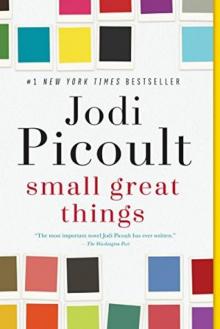 Small Great Things
Small Great Things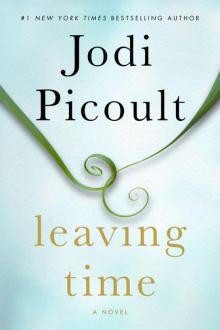 Leaving Time
Leaving Time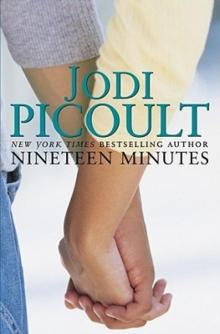 Nineteen Minutes
Nineteen Minutes Larger Than Life
Larger Than Life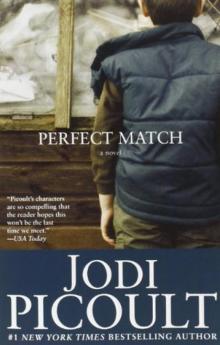 Perfect Match
Perfect Match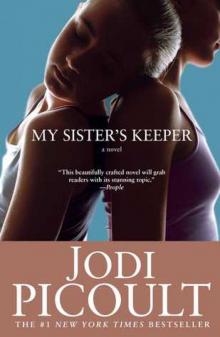 My Sister's Keeper
My Sister's Keeper The Pact
The Pact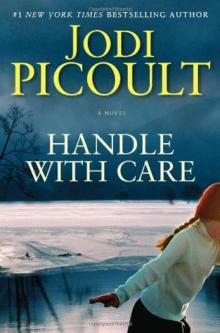 Handle With Care
Handle With Care Songs of the Humpback Whale
Songs of the Humpback Whale Mermaid
Mermaid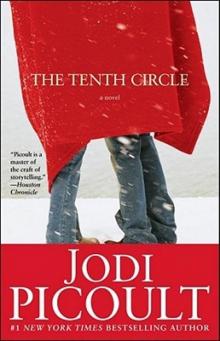 The Tenth Circle
The Tenth Circle The Color War
The Color War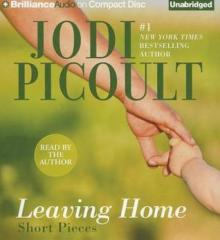 Leaving Home: Short Pieces
Leaving Home: Short Pieces House Rules
House Rules Lone Wolf
Lone Wolf The Storyteller
The Storyteller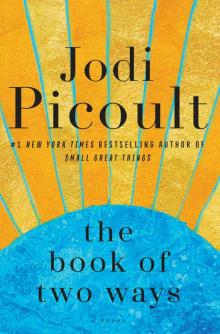 The Book of Two Ways
The Book of Two Ways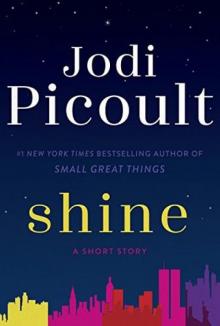 Shine
Shine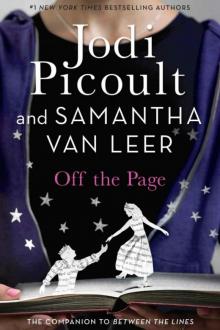 Off the Page
Off the Page Sing You Home
Sing You Home Second Glance: A Novel
Second Glance: A Novel Mercy
Mercy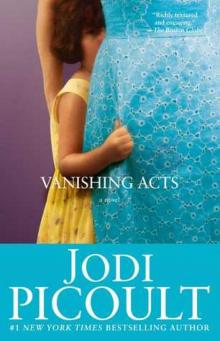 Vanishing Acts
Vanishing Acts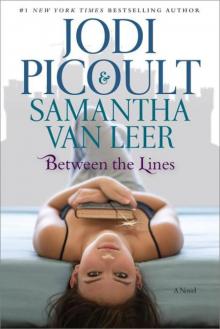 Between the Lines
Between the Lines Plain Truth
Plain Truth Salem Falls
Salem Falls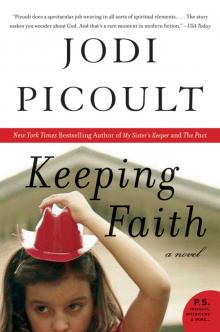 Keeping Faith
Keeping Faith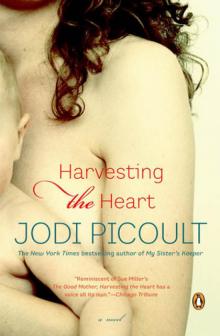 Harvesting the Heart
Harvesting the Heart Change of Heart
Change of Heart Where There's Smoke
Where There's Smoke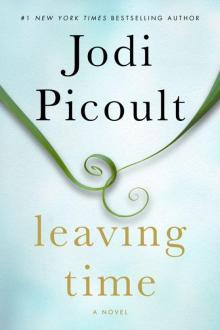 Leaving Time: A Novel
Leaving Time: A Novel Over the Moon
Over the Moon House Rules: A Novel
House Rules: A Novel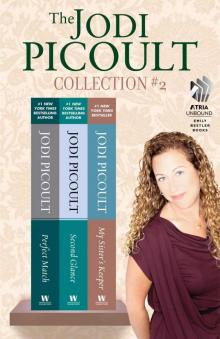 The Jodi Picoult Collection #2
The Jodi Picoult Collection #2 Leaving Home: Short Pieces (Kindle Single)
Leaving Home: Short Pieces (Kindle Single)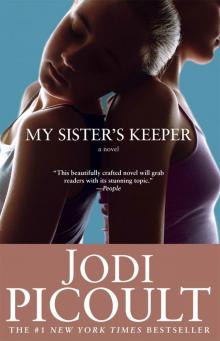 My Sister's Keeper: A Novel
My Sister's Keeper: A Novel![Mermaid [Kindle in Motion] (Kindle Single) Read online](http://i1.bookreadfree.com/i1/04/03/mermaid_kindle_in_motion_kindle_single_preview.jpg) Mermaid [Kindle in Motion] (Kindle Single)
Mermaid [Kindle in Motion] (Kindle Single)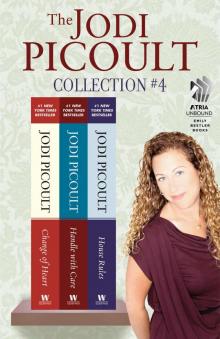 The Jodi Picoult Collection #4
The Jodi Picoult Collection #4 Sing You Home: A Novel
Sing You Home: A Novel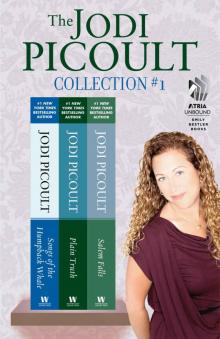 The Jodi Picoult Collection
The Jodi Picoult Collection Lone Wolf A Novel
Lone Wolf A Novel Second Glance
Second Glance Larger Than Life (Novella)
Larger Than Life (Novella)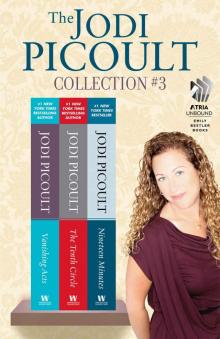 The Jodi Picoult Collection #3
The Jodi Picoult Collection #3